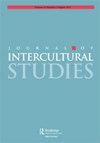Brazilians in Dongguan: Migration Across Analogous Industrial Clusters and (Re)creation of Homeland Abroad
IF 1
Q3 SOCIOLOGY
引用次数: 0
Abstract
ABSTRACT This article explores a case of international migration across analogous industrial clusters (IMAAIC), a form of skilled migration largely linked to South-South migration flows. Using the migration from Southern Brazil to Dongguan, China as the unit of analysis, this article presents an ethnographic account based on documental research and participant observation data collected between 2017 and 2021. The findings map the origins of this migration wave and report on the collective homemaking practices of this community in China. The article discusses three characteristics of the Brazilian migration to Dongguan – namely peripheral, narrow, and contingent – and argues that these elements have constitutive effects on the community's social experiences of homemaking in China, particularly by intensifying practices of (re)creation of homeland abroad. This article contributes to the field of Brazilian diasporic research and South-South migration by reporting on an unexplored migrant community. It also proposes that international migration across analogous industrial clusters is a transnational phenomenon that requires further conceptualisation and study.东莞的巴西人:跨类似产业集群的迁移与海外家园的(再)创造
本文探讨了跨类似产业集群(IMAAIC)的国际移民案例,这是一种主要与南南移民流动相关的技术移民形式。本文以从巴西南部迁移到中国东莞为分析单元,基于文献研究和2017 - 2021年收集的参与者观察数据,提出了一种民族志描述。研究结果描绘了这一移民浪潮的起源,并报告了中国这一群体的集体家务实践。本文讨论了巴西人移民东莞的三个特征——外围性、狭窄性和偶然性——并认为这些因素对中国社区的家政社会经验产生了构成性影响,特别是通过加强海外(再)创造家园的实践。本文通过报道一个未开发的移民社区,为巴西侨民研究和南南移民领域做出了贡献。它还提出,跨类似产业集群的国际移民是一种跨国现象,需要进一步概念化和研究。
本文章由计算机程序翻译,如有差异,请以英文原文为准。
求助全文
约1分钟内获得全文
求助全文
来源期刊

Journal of Intercultural Studies
SOCIOLOGY-
CiteScore
1.80
自引率
10.00%
发文量
67
期刊介绍:
Journal of Intercultural Studies showcases innovative scholarship about emerging cultural formations, intercultural negotiations and contemporary challenges to cultures and identities. It welcomes theoretically informed articles from diverse disciplines that contribute to the following discussions: -Reconceptualising notions of nationhood, citizenship and belonging; -Questioning theories of diaspora, transnationalism, hybridity and ‘border crossing’, and their contextualised applications; -Exploring the contemporary sociocultural formations of whiteness, ethnicity, racialization, postcolonialism and indigeneity -Examining how past and contemporary key scholars can inform current thinking on intercultural knowledge, multiculturalism, race and cultural identity. Journal of Intercultural Studies is an international, interdisciplinary journal that particularly encourages contributions from scholars in cultural studies, sociology, migration studies, literary studies, gender studies, anthropology, cultural geography, urban studies, race and ethnic studies.
 求助内容:
求助内容: 应助结果提醒方式:
应助结果提醒方式:


